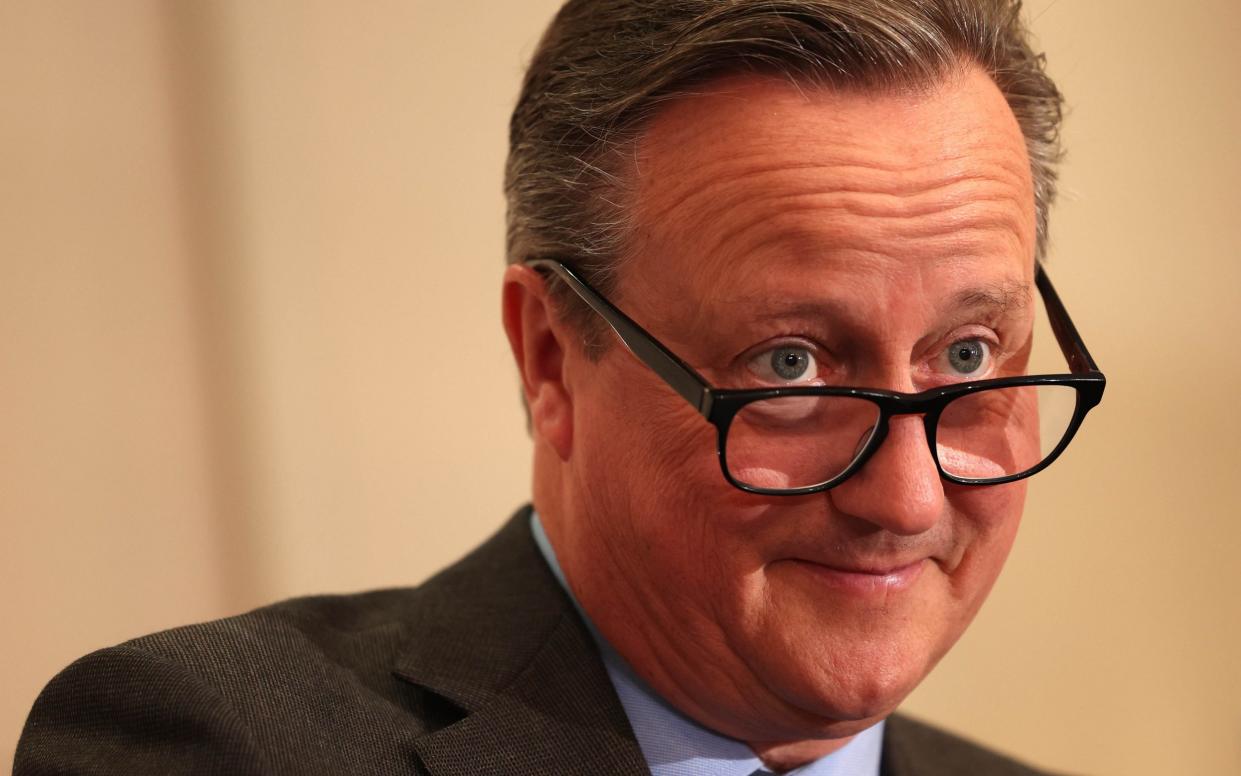Cameron, not Farage, destroyed the Conservatives

David Cameron is back from outer space to tell us Nigel Farage wants to destroy the Conservative Party, that he’s playing “dog-whistle” politics and, we can infer, the Tories ought to run a mile from him. Thus the battle lines of the next leadership contest are drawn. Early advantage goes to elites who will say the party wandered too far to the Right – a view endorsed by a billion deadly dull podcasts made by people who think the Today programme is insufficiently subjective.
Let’s put this myth to bed so I never have to write this column again. The Tory party is not Right-wing. It won in 2019 when people thought it was Right-wing, that it would implement Brexit, cut immigration and lower taxes. It is losing now thanks to a record of higher taxes, soaring migration and a Brexit you might think had never happened (unless you try to smuggle a dog into Ulster).
Moreover, the Tories are not losing to Reform but to Labour, which is pretending to be low-tax and low-immigration. Though one or two polls show Reform neck and neck with or outpacing the Tories, others have it hovering around 14 per cent.
In fact Reform is not yet as popular as Ukip was under David Cameron, when it placed first in the 2014 European elections and won two seats in Parliament. It once hit 25 per cent in the polls; in July 2013, it stood within a single point of beating the Tories, who languished 13 per cent behind Labour. Nostalgic wets forget that Ed Miliband led Cameron throughout much of the Coalition period, or that George Osborne was booed at the 2012 Paralympics (the pinnacle of Big Society Britain).
George has also made an intervention this year, quoting John Major’s advice that “we will never win while we remain in thrall to the hard Right of the party”. In 2024, I’m not sure who this hard-Right is or who is supposed to be thralling over them. Liz Truss? Jacob Rees-Mogg? All relegated to the backbenches and sadly ignored. As for Major, he lost in 1997 because the country had endured a painful recession and the Tories raised taxes to cover it. Factionalism didn’t help, granted, but it’s precisely a leader’s job to paper over the cracks.
All in all, there’s a better case for claiming David Cameron destroyed the Tory party than Farage. If you’re a Remainer, you’d say he was guilty of doing exactly what he’s now warning the Tories against: he capitulated to the “swivel-eyed loons” by pledging to hold an in/out referendum – while cutting down “green crap” and labelling multiculturalism a failure. As a PM, Dave blew enough whistles to trigger a riot at Crufts.
If you’re a Brexiteer, on the other hand, the problem with Dave was that he made a virtue out of alienating traditionalists. Centrist dads believe that for every Right-wing vote the Conservatives deliberately lose, they gain four from the middle. But Farage has proven you still need a base to win; Starmer, that the middle is mobile. The centre-ground in 2024 has shifted dramatically to the Right. Hence, when asked at the ITV debate who would like to cut legal migration, all four main parties raised their hands – including the Lib Dems.
Maybe they are all wrong. Maybe immigration is a moral good and we need more of it – in which case, why didn’t previous Tory leaders explain this to us rather than cook up an unrealistic policy of reducing net migration to the “tens of thousands”. Remind me: who did that?
Brexit didn’t destroy the Conservative Party; it revived it in 2019. Farage didn’t destroy the Conservative Party; he made Boris’s majority possible by effectively pulling out of that election. Lockdown destroyed the chances of any government getting re-elected by wrecking the economy, the work ethic and the NHS. But Cameron also destroyed the party’s ability to weather such storms by uprooting Toryism from its constituency and philosophy. Deprived of soil and water, it lies dying.
Putting matters into perspective
“Conservatism”, said Peter Hitchens recently, is “love of God, of country and of family, of liberty, of truth, of duty, of courage, of the law of the land, of tradition, of beauty and honour.” I might add “love of Midsomer Murders”, but otherwise: “bingo”. By this definition, the greatest moment in conservatism was not, as Rishi Sunak seems to believe, Nigel Lawson’s 1988 budget but when Jose Sanchez del Rio, executed by Mexican revolutionaries, used his last breath to draw a cross on the ground with his blood.
Contrast that with the Conservative manifesto, which contains no coherent statement of philosophy and, with its retail offer of policies we surely cannot afford, has all the idealism of the Argos catalogue. The longer the election goes on, the madder the Tories look – Penny Mordaunt yelling “higher taxes!” at bemused panellists on The Weakest Link – and the greater one’s resentment that they are still in office, or that there is any government at all.
Only in the kingdom of the dogs can one see clearly. In the nearby field last week, dogs queued up – they really did take it in turns – to roll in something. “Don’t worry,” a woman said, “it’s just a worm.” And my dog, once he’d taken a few tumbles, captured some sun on his belly and refused to move. He lay tanning himself on top of a worm, blissfully unaware of polls, tax rises or Sir Keir Starmer.

 Yahoo News
Yahoo News 
